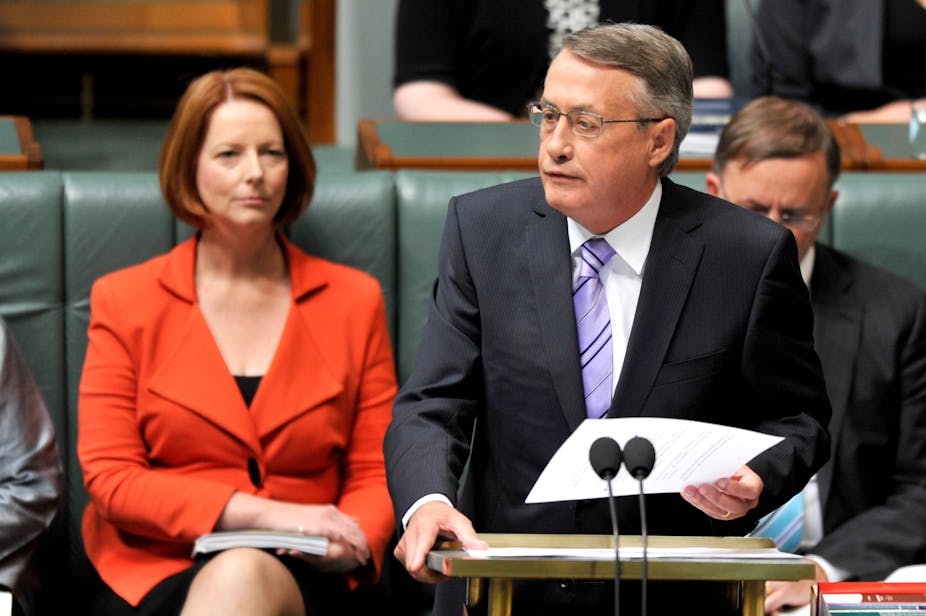When looking at the budget it’s useful to remember, in the cold light of day, that politics, at its most fundamental level, is about relationships of power. It is about conflict, both overt and covert, between individuals, groups and ideas.
As the document that sets out how the nation will spend and save its money, the budget lies at the heart of politics and representative government in Australia.
The budget is much more than economics. It is politics in action. Because resources are finite, there will inevitably be winners and losers from the budget.
It is a government’s responsibility to balance these competing interests and to use the budget to set its policy direction for the coming years. Have Julia Gillard and Wayne Swan been able to deliver on this task?
Talking tough
For weeks Wayne Swan has been talking “tough” on the budget. It needed to return to surplus, and this would inevitably require cuts.
The effects of the global financial crisis were still hanging over the economy, taxation revenue was down, and natural disasters had hit the country. Australians had to brace themselves for tough measures in what was a challenging time.
Preparing the population for the worst and reducing expectations is often an effective way to find acquiescence with policy decisions that might otherwise elicit negative reactions.
When the budget was finally released last night, the general reaction appeared to be “it’s not quite a tough as we thought”. The government found savings of about $1bn within its own coffers and restricted its spending increase to just 1% over the financial year, but the budget will not return to surplus until 2012-13.
While it may not have been as tough on spending cuts as some may have liked or anticipated, the budget was strong on narrative.
Focus on jobs
Employment was the main focus of the document, with the announcement of initiatives designed to get all Australians into paid work, to create additional training programs and increase skilled migration to address labour shortages in the economy.
Julia Gillard and Wayne Swan’s long term vision for the prosperity of the country was one in which all Australians participated in the workforce, where no hands were left idle, and everyone could share in the benefits of the boom.
The additional spending and investment in training and increasing workforce participation is a measure necessary to increase capacity in the economy.
Off welfare and into work
However, what has raised more concern are the associated tax incentives and cuts to welfare payments designed to get individuals back into work.
These cuts target the disabled and the long-term unemployed under the mantra “providing opportunity, demanding responsibility”, and include tax cuts for single parents, phasing out the dependent spouse tax offset, allowing welfare recipients to work more hours before payments are suspended, and updating the definition of incapacity.
To this end, welfare recipients – those typically on the lowest incomes and with little or no voice in the political system - appear to be the losers in the budget.
Middle-class welfare and defence spending have also taken hits.
The winners

In addition to the money spent on getting Australians into work, one of the big “winners” in this year’s budget was mental health.
The government pledged an additional investment of $1.5 billion of over 5 years. But the victory has not been swift: pressure groups, medical experts and politicians have lobbied the government for this investment for years.
Regional health has also received a boost, and money has been allocated to selected infrastructure projects such as improving the Pacific Highway in NSW.
Indeed, one of the winners from last night’s budget was Independent MP Rob Oakeshott, whose electorate of Lyne is set to directly benefit from the highway upgrade. Oakeshott claimed credit for the spending as a condition of his coalition negotiations with the Labor Party last year.
At the same time, the Greens have criticised the budget for neglecting public transport and investment in a green economy.
An uncontroversial budget
In all, the budget has caused relatively little controversy, due in part to the government’s careful narrative and rhetoric of long-term prosperity through increasing workforce participation.
Although it does not remove the fact that there will inevitably be winner and losers from any allocation of resources, pitching the budget in this way mitigates conflict between competing demands and groups in society as in this narrative everyone participates, contributes to, and ultimately shares wealth.
A key phrase from the speech aptly articulates this sentiment: “we believe in the Australian promise that if you work hard, you won’t be left behind”. However, it is not difficult to see how this vision could be problematic – what of those citizens who can’t work? Will the government leave them behind?
In some ways the government’s task in delivering the budget was made easier by the constraints placed upon it by prudent economic management.
At the beginning of his budget speech Wayne Swan clearly articulated the “rights” and the “wrongs” of responsible budgeting. He noted that a deficit was right in a recession, but when an economy is set to grow again, heading back into surplus was the right thing to do.
If politics and budgets are about contests over resources and ideas, the real winner last night was the overarching constraint that a “country needs to live within its means”.
A final way to manage conflict is to add a disclaimer to the document you are proposing. For Swan, this came by way of several references to the introduction of the government’s tax on carbon. Buried in the budget was also $8 million for a carbon tax advertising campaign. If this tax is implemented, the budget will need to be reconsidered. Nothing is ever really settled in politics.

